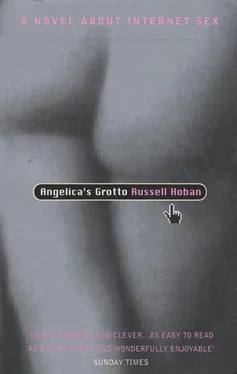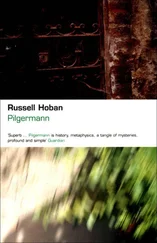‘Hello, Ruggi. Are you there?’ said Angelica.
‘Yes, I’m here.’
‘I must say, Ruggi, that I feel more than a little disappointed in you tonight. I was looking forward to a really interesting videotape and now Leslie tells me that you weren’t up to it.’
‘It wasn’t very nice of you to say you’d meet me and then set me up to be Monicaed.’
‘I never said I was very nice. I’m not even sure you’d like me if I were very nice. You do like me, don’t you?’
‘I don’t know that liking comes into it. Was the other voice your regular partner?’
‘Lydia? No, she just dropped in for some popcorn and a video and one thing led to another. I haven’t got a regular partner. “Every day is a winding road …” yes? Ahhh, Lydia! I have to go, Ruggi — she’s at me again. I’m sorry this isn’t a videophone but you can listen to us until I can give you my undivided attention. Or better still, I’ll give you a running commentary on what we’re up to, and all for the price of a local call. Happy Hour for you, Ruggi.’
‘Why not?’ said Klein. He listened and enjoyed.
‘Now, then, Ruggi,’ said Angelica when she and Lydia had reached an interval. ‘What shall we talk about?’
‘Perhaps we could start with why you wanted to do that to me.’
‘Do what to you?’
‘Leslie and the van: Harold’s Monday Night.’
‘Aha! Your real name! Not all that heroic, is it.’
‘Are you going to answer my question?’
‘Are you going to tell me you wouldn’t have enjoyed it?’
‘Enjoy it! I don’t think I’d have survived it.’
‘It might have been a good way to go, though, mightn’t it?’
‘So you were hoping for a snuff movie, were you?’
‘Please, Ruggi — I’m not a monster! I just wanted to see how you’d like what you found so entertaining when it was done to a woman. And really, that’s what you were expecting, wasn’t it? You wimped out at the last minute but you knew it was on the cards, right?’
‘No, I didn’t; I was expecting to meet you as arranged.’
‘I don’t believe you, Harold. When we arranged this rendezvous I gave you plenty of clues: same place, same time of a Monday night — everything but the rain, which was forecast but didn’t happen.’
‘I don’t think the way you do; you said you’d be there and it was you I expected to see when the van pulled up.’
‘Poor you! Can you really be that simple?’
‘Yes, I really can. Are you always devious, never simple?’
‘I’m devious in a simple way, Ruggi: you just can’t count on me for anything but trouble. Got to say goodbye now. Bye-bye.’
‘This is not a good time in my life,’ said Klein. ‘When was a good time?’ He saw the Hungerford Bridge over the shining evening river, the lights of boats coming and going, the Royal Festival Hall brilliant with expectation across the water, and Hannelore at his side. ‘Die Schöpfung,’ he said, ‘that was a good time.’ He put on the Berlin Philharmonic recording with von Karajan conducting, and the first bars of the orchestral prelude opened The Representation of Chaos. ‘What a beautiful chaos,’ he said: ‘so warm and dark and full of good things. 1970 that was, or 1971. Was that the same chaos that Oannes arose from? A different part of it maybe, not so black.’
The music lifted him out of the present, cradled him in the safety of that good time long gone. When the chorus reached ‘Und es ward Licht’ he wept as always, then hummed along with Fritz Wunderlich on the first day. When Gundula Janovitz made her entrance as Gabriel on the second day he wept some more, marvelling at the perfection of Haydn’s world that never grew old, never filled up with rubbish and defeat. ‘How beautiful London was at night, with its illuminated domes and spires and clocks,’ he said, ‘how shining the river!’
Gone, said his inner voice.
‘You spoke!’ said Klein. ‘That was you, wasn’t it, Oannes? You said, “Gone.” I’m sure it wasn’t me. Or was it?’
No answer.
‘If it was you, why did you speak then? What does it mean that you chose this moment to break your silence? I know very well that the good time is gone, so why do you need to belabour the obvious with that one word like the voice of doom? Are you trying to tell me something, like my life is no longer worth bothering with and I should pack it in? What?’
There came to Klein, dim and shadowy, lit by one bare light bulb, the cellar of the house he had lived in as a child. In it were a coal furnace, a coalbin, and a large black boiler lying down against a wall. Elsewhere in it were sledges, rolls of tar paper, various lumber, rakes, shovels, and mouldering bits of carpet. ‘My Noah’s ark,’ he said. ‘It had a red roof and Mr and Mrs Noah and the animals were printed on glossy paper glued to plywood shapes. I used to think it was lost behind the boiler. Why would it have been down there? I can’t remember. I still think that’s where it ended up. I looked under the boiler with a torch and I poked behind it with a stick but I always imagined huge spiders there and I never felt around for it with my hand. Even now, in dark corners of this country where I was never a child, I think of looking for my lost Noah’s ark. Are you with me, Oannes?’
No answer.
‘My inner voice,’ said Klein, ‘it spoke. Oannes said a word.’
‘What was the word?’ said Dr DeVere.
‘“Gone”. I’d been talking to myself about how this was a bad time and I was remembering a good time when Hannelore and I went to the Royal Festival Hall for Die Schöpfung. That’s when he said, “Gone,” which of course they are — Hannelore and the good time both.’
‘Try to remember as precisely as you can: where was this voice coming from?’
‘From me, the same as it used to. I could feel the word in my throat.’
‘From inside your head, not from outside?’
‘Look, Doc, I’m not crazy. When I say that Oannes spoke I mean that that part of me spoke, OK?’
‘What did you think when you heard that word?’
‘I was wondering if he, if I was telling myself that I had nothing good to look forward to.’
‘And after that thought?’
‘After that I saw in my mind the Noah’s ark I lost as a child.’
‘Can you remember how you lost it?’
‘No.’
‘Did you ever find it?’
‘No. All I can remember is the smell of the cellar and the darkness and that big black boiler I thought the Noah’s ark had fallen behind. I kept looking for it and it was never there.’
‘Gone.’
‘Gone. Life is full of gonenesses; I’m used to it. I keep on doing what I do; I’ll finish the book on Klimt and then if I’m still around I’ll do another one. The main action right now is with Angelica. Have a look at these.’ Klein had printed out ‘Monica’s Monday Night’ and he laid the pages on Dr DeVere’s desk.
DeVere scanned them quickly. ‘This is the picture-story we talked about in our last session?’
‘That’s right. The man in the photos is called Leslie; he’s an associate of Angelica’s. She and I had arranged to meet last night but it was Leslie who showed up, with a van. He was about to do a Monica job on me in front of a videocamera but I started to get angina and he let me go.’
‘You were surprised when it was Leslie instead of Angelica?’
‘Yes, I was.’
‘What about the angina? What brought it on?’
‘I was afraid of what was going to happen.’
‘You mean anal rape?’
Читать дальше












